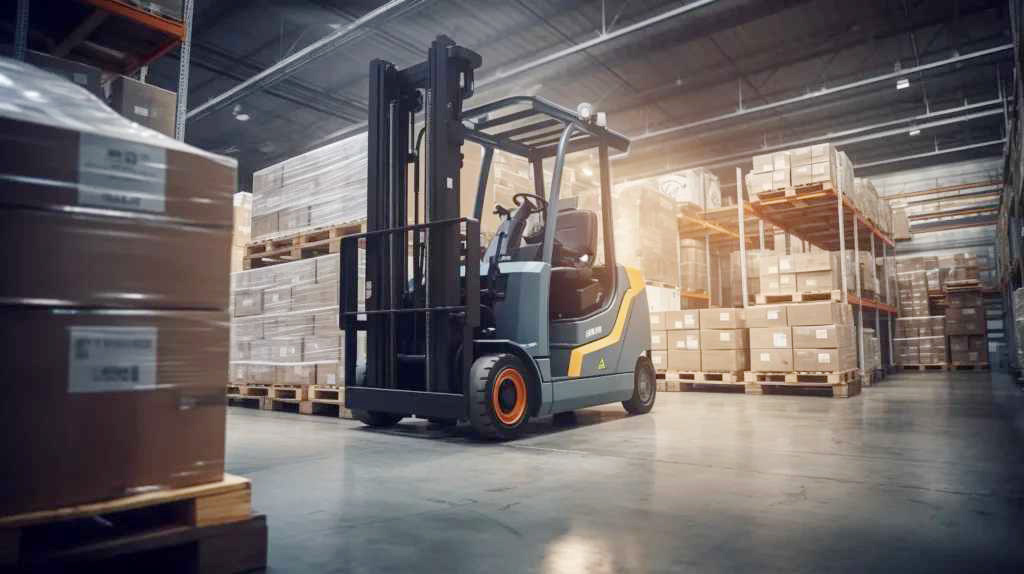จากประสิทธิภาพการใช้พลังงานสู่การยืดอายุการใช้งาน เทคโนโลยี BMS ขั้นสูงกำลังปฏิวัติการดำเนินงานของรถยกด้วยแบตเตอรี่ LiFePO₄
ในสภาพแวดล้อมคลังสินค้าและโลจิสติกส์ที่เร่งรีบในปัจจุบัน รถยกไฟฟ้าได้กลายเป็นกระดูกสันหลังของการจัดการวัสดุ ในขณะที่ธุรกิจต่างๆ มุ่งเน้นไปที่ประสิทธิภาพที่สูงขึ้น ชั่วโมงการทำงานที่ยาวนานขึ้น และลดเวลาหยุดทำงาน บทบาทของแบตเตอรี่ลิเธียมเหล็กฟอสเฟต (LiFePO₄) จึงมีความสำคัญอย่างยิ่ง หนึ่งในเครื่องมือที่ทรงพลังที่สุดในการเพิ่มประสิทธิภาพและอายุการใช้งานของแบตเตอรี่เหล่านี้คือ ระบบจัดการแบตเตอรี่ (BMS)บทความนี้เจาะลึกถึงวิธีที่ระบบบริหารจัดการแบตเตอรี่ (BMS) สามารถเพิ่มประสิทธิภาพการทำงานของแบตเตอรี่ LiFePO₄ ในรถยกไฟฟ้า โดยเน้นไปที่วิธีที่ระบบเหล่านี้ช่วยเพิ่มประสิทธิภาพ ประสิทธิผลด้านความปลอดภัย และส่งเสริมการดำเนินงานที่ยั่งยืน
บทบาทของระบบจัดการแบตเตอรี่ (BMS) ในการเพิ่มประสิทธิภาพการทำงานของแบตเตอรี่
เอ ระบบจัดการแบตเตอรี่ (BMS) เป็นส่วนประกอบที่สำคัญอย่างยิ่งในสมัยใหม่ แบตเตอรี่ลิเธียมไอออนโดยเฉพาะอย่างยิ่งสำหรับการใช้งานเช่นรถยกไฟฟ้า ที่มีความต้องการพลังงานสูงและชั่วโมงการทำงานยาวนานเป็นปกติ หน้าที่หลักของระบบ BMS คือ ตรวจสอบและควบคุมการชาร์จและการคายประจุของแบตเตอรี่, เพื่อให้มั่นใจว่ามันทำงานอย่างปลอดภัยและมีประสิทธิภาพ
1. การตรวจสอบวงจรการชาร์จและการคายประจุ
แบตเตอรี่ LiFePO₄ แม้จะมีประสิทธิภาพสูง แต่ก็ไวต่อวงจรการชาร์จและการคายประจุ การชาร์จเกินหรือการชาร์จไม่เพียงพออาจนำไปสู่ การเสื่อมสภาพของแบตเตอรี่ และ อันตรายจากความปลอดภัย. BMS มีบทบาทสำคัญโดย ตรวจสอบสถานะการชาร์จ (SOC) อย่างต่อเนื่อง และ สภาพสุขภาพ (SOH) ของแบตเตอรี่ โดยให้ข้อมูลแบบเรียลไทม์เกี่ยวกับระดับการชาร์จ, แรงดันไฟฟ้า, และอุณหภูมิของแบตเตอรี่ ด้วยการทำให้แน่ใจว่าแบตเตอรี่ไม่ถูกชาร์จเกินหรือถูกใช้จนเกินขีดจำกัด BMS จึงป้องกัน ความเสียหายของเซลล์, จึงช่วยยืดอายุการใช้งานของแบตเตอรี่
2. การป้องกันจากความร้อนและหนาวจัด
แบตเตอรี่ LiFePO₄ แม้จะมีเสถียรภาพมากกว่าเคมีลิเธียมไอออนชนิดอื่น แต่ก็ยังคงเผชิญกับความท้าทายเมื่อสัมผัสกับอุณหภูมิที่รุนแรง ระบบจัดการแบตเตอรี่ (BMS) ช่วยจัดการกับความท้าทายเหล่านี้โดย การตรวจสอบและควบคุมอุณหภูมิ ภายในชุดแบตเตอรี่ หากอุณหภูมิเกินขีดจำกัดที่ปลอดภัย ระบบจัดการแบตเตอรี่ (BMS) จะทำงาน ระบบทำความเย็น หรือ จำกัดอัตราการชาร์จ/การคายประจุ เพื่อป้องกันการเกิดภาวะความร้อนเกินควบคุม คุณสมบัตินี้มีความสำคัญอย่างยิ่งในสภาพแวดล้อมที่มีการเปลี่ยนแปลงอย่างรวดเร็วของการดำเนินงานในคลังสินค้า ที่รถยกมักทำงานในสภาพแวดล้อมที่มีอุณหภูมิเปลี่ยนแปลงบ่อย
ฟังก์ชันหลักของระบบบริหารจัดการแบตเตอรี่ (BMS) ในการเพิ่มประสิทธิภาพแบตเตอรี่ LiFePO₄
ระบบการจัดการแบตเตอรี่ไม่ได้ทำเพียงแค่การตรวจสอบสุขภาพของแบตเตอรี่เท่านั้น แต่ยังให้ข้อมูลแบบเรียลไทม์ และใช้ 알고ริทึมขั้นสูงเพื่อเพิ่มประสิทธิภาพการทำงานของแบตเตอรี่ ซึ่งช่วยเพิ่มประสิทธิภาพทั้งสองด้าน ประสิทธิภาพ และ อายุยืน.
1. ประสิทธิภาพการใช้พลังงานและการกระจายโหลด
หนึ่งในฟังก์ชันหลักของระบบบริหารจัดการอาคาร (BMS) คือการเพิ่มประสิทธิภาพ ประสิทธิภาพการใช้พลังงาน ระหว่างการใช้งาน โดยการจัดการรอบการชาร์จและการคายประจุ และควบคุม การกระจายโหลด ทั่วเซลล์แบตเตอรี่, BMS ทำให้แน่ใจว่าพลังงานถูกใช้ประโยชน์อย่างมีประสิทธิภาพ. ซึ่งนำไปสู่ ประสิทธิภาพที่สูงขึ้นโดยเฉพาะอย่างยิ่งในรถยกไฟฟ้า ซึ่งต้องพึ่งพาการจัดการพลังงานที่แม่นยำเพื่อให้การทำงานราบรื่นตลอดกะการทำงานที่ยาวนาน
2. การปรับความเร็วในการชาร์จ
เวลาในการชาร์จเป็นปัจจัยสำคัญในการดำเนินงานของคลังสินค้า ยิ่งรถยกสามารถกลับมาใช้งานได้เร็วเท่าไร การทำงานก็จะยิ่งมีประสิทธิภาพมากขึ้นเท่านั้น ระบบ BMS ควบคุม ความเร็วในการชาร์จ เพื่อให้แน่ใจว่าแบตเตอรี่ชาร์จได้อย่างรวดเร็วโดยไม่ทำให้เกิดความร้อนสูงเกินไปหรือทำให้สุขภาพของแบตเตอรี่เสื่อมลง ด้วยการปรับสมดุลระหว่างความเร็วในการชาร์จและอุณหภูมิอย่างระมัดระวัง BMS สามารถลด เวลาหยุดทำงาน และ เพิ่มเวลาการดำเนินงานให้สูงสุด, ส่งผลให้ การหยุดชะงักน้อยลง และ เพิ่มผลผลิต.
3. การตรวจสอบสุขภาพแบตเตอรี่และการบำรุงรักษาเชิงพยากรณ์
โซลูชัน BMS สมัยใหม่มาพร้อมกับ การบำรุงรักษาเชิงคาดการณ์ ความสามารถ. โดยการรวบรวมข้อมูลอย่างต่อเนื่องจากประสิทธิภาพของแบตเตอรี—เช่น แรงดันไฟฟ้า, อุณหภูมิ, และรอบการชาร์จ—ระบบสามารถทำนายการล้มเหลวหรือปัญหาประสิทธิภาพที่อาจเกิดขึ้นได้ก่อนที่มันจะเกิดขึ้น. ซึ่งทำให้สามารถ การแทรกแซงในระยะแรก, ลดความเสี่ยงของการหยุดทำงานที่ไม่คาดคิดและค่าใช้จ่ายในการบำรุงรักษา. ข้อมูลเชิงลึกที่คาดการณ์ได้ช่วยให้ธุรกิจวางแผนตารางการบำรุงรักษาได้อย่างมีประสิทธิภาพมากขึ้น, ป้องกันการหยุดชะงักที่มีค่าใช้จ่ายสูงในกระบวนการทำงาน.
การเติบโตของระบบ BMS อัจฉริยะ: การผสานรวม AI กับการปรับแต่งแบบเรียลไทม์
ในช่วงไม่กี่ปีที่ผ่านมา เทคโนโลยี BMS ได้พัฒนาอย่างมีนัยสำคัญด้วยการผสานรวมของ ปัญญาประดิษฐ์ (AI) และ การเรียนรู้ของเครื่อง (ML)ระบบอัจฉริยะเหล่านี้กำลังผลักดันขีดจำกัดของความเป็นไปได้ในการจัดการแบตเตอรี่ และเพิ่มประสิทธิภาพของแบตเตอรี่ LiFePO₄ อย่างต่อเนื่อง
1. การจัดการพลังงานด้วยปัญญาประดิษฐ์
ระบบ BMS ที่ใช้ AI สามารถ วิเคราะห์ข้อมูลจำนวนมากในเวลาจริง และเรียนรู้จากรูปแบบการดำเนินงานในอดีตเพื่อสร้าง การตัดสินใจที่ชาญฉลาดยิ่งขึ้น เกี่ยวกับวิธีการและเวลาในการชาร์จหรือปล่อยประจุแบตเตอรี่ ตัวอย่างเช่น ระบบอาจจดจำรูปแบบการใช้งานของรถยก เช่น ช่วงเวลาที่มีความต้องการพลังงานสูงหรือช่วงเวลาที่ไม่ใช้งาน และปรับรอบการชาร์จให้เหมาะสม ความสามารถนี้ในการ ทำนายความต้องการพลังงาน และเพิ่มประสิทธิภาพการใช้แบตเตอรี่แบบเรียลไทม์ ช่วยเพิ่มประสิทธิภาพและลดการสิ้นเปลือง
2. การปรับตัวแบบเรียลไทม์ต่อสภาพแวดล้อมที่เปลี่ยนแปลง
ในสภาพแวดล้อมคลังสินค้าทั่วไป สภาพการทำงานสามารถเปลี่ยนแปลงได้อย่างรวดเร็ว รถยกอาจเคลื่อนย้ายจากพื้นที่ที่เย็นและควบคุมอุณหภูมิไปยังพื้นที่ที่อุ่นขึ้นและมีความชื้นแตกต่างกัน ระบบ BMS ที่ชาญฉลาดสามารถ ปรับตัวแบบเรียลไทม์ ต่อสภาพแวดล้อมที่เปลี่ยนแปลงเหล่านี้ ปรับอัตราค่าบริการ ระบบทำความเย็น และการจัดสรรพลังงานเพื่อเพิ่มประสิทธิภาพการทำงานให้สูงสุด ซึ่งจะทำให้ ประสิทธิภาพสูงสุดถูกคงไว้ ไม่คำนึงถึงปัจจัยสิ่งแวดล้อมที่เปลี่ยนแปลง
3. การเรียนรู้จากการใช้แบตเตอรี่และสภาพแวดล้อม
ระบบจัดการแบตเตอรี่ (BMS) ที่ขับเคลื่อนด้วย AI ไม่ได้เพียงแค่ปรับการชาร์จและการคายประจุให้เหมาะสมตามพารามิเตอร์ที่กำหนดไว้ล่วงหน้าเท่านั้น—แต่ยังเรียนรู้จาก พฤติกรรมที่ไม่เหมือนใคร ของแต่ละแบตเตอรี่และ สิ่งแวดล้อม ซึ่งมันดำเนินการอยู่ สิ่งนี้ช่วยให้เกิดความสมดุล แนวทางที่ปรับให้เหมาะสมมากขึ้น การจัดการแบตเตอรี่ ช่วยให้ธุรกิจลดต้นทุนการดำเนินงานโดยเพิ่มอายุการใช้งานของแบตเตอรี่และลดการบำรุงรักษาที่ไม่คาดคิด
กรณีศึกษา: การนำเทคโนโลยี BMS ขั้นสูงมาใช้เพื่อเพิ่มประสิทธิภาพการทำงานของรถยก
เพื่อแสดงให้เห็นถึงประโยชน์ที่จับต้องได้ของเทคโนโลยี BMS ขั้นสูง เรามาดูกรณีศึกษาของบริษัทโลจิสติกส์คลังสินค้าชั้นนำที่ได้นำ เทคโนโลยี BMS อัจฉริยะ สำหรับกองเรือของพวกเขา รถยกไฟฟ้า.
ความท้าทาย:
บริษัทเผชิญกับความท้าทายอย่างมากเกี่ยวกับเวลาที่แบตเตอรีไม่สามารถใช้งานได้และค่าใช้จ่ายในการบำรุงรักษา ระบบการจัดการแบตเตอรีที่มีอยู่เป็นระบบพื้นฐานและไม่มีศักยภาพในการ ทำนายสุขภาพแบตเตอรี่ หรือ เพิ่มประสิทธิภาพ แบบเรียลไทม์ สิ่งนี้นำไปสู่ปัญหาที่เกิดขึ้นบ่อยครั้ง เช่น แบตเตอรี่ประสิทธิภาพต่ำ, เวลาหยุดทำงานที่ไม่คาดคิด, และ ค่าบำรุงรักษาสูง.
โซลูชัน:
หลังจากที่ได้ดำเนินการระบบขั้นสูงมากขึ้น ระบบบริหารจัดการอาคารที่ขับเคลื่อนด้วยปัญญาประดิษฐ์, บริษัทได้เห็นการปรับปรุงทันที ระบบใหม่ให้การตรวจสอบแบบเรียลไทม์, การแจ้งเตือนการบำรุงรักษาเชิงป้องกัน, และการควบคุมที่แม่นยำของวงจรการชาร์จและการคายประจุ. ผลที่ตามมาคือ รถยกได้ประสบกับ การปรับปรุงประสิทธิภาพอย่างมีนัยสำคัญ, พร้อมด้วย การเสียหายน้อยลง และ เวลาการดำเนินการที่รวดเร็วขึ้น ระหว่างกะการทำงาน ระบบ BMS ขั้นสูงยังช่วยลด ค่าใช้จ่ายในการเปลี่ยนแบตเตอรี่ โดยการยืดอายุการใช้งานของแบตเตอรี่ LiFePO₄ ได้สูงสุดถึง 30%
ผลลัพธ์:
- อายุการใช้งานแบตเตอรี่เพิ่มขึ้น 301%.
- ลดค่าใช้จ่ายในการบำรุงรักษา 50%.
- เวลาการทำงานที่ต่อเนื่องเพิ่มขึ้น และ ลดเวลาหยุดทำงานของรถยก.
กรณีนี้แสดงให้เห็นว่าเทคโนโลยี BMS ขั้นสูง ซึ่งมีความสามารถในการตรวจสอบ ทำนาย และเพิ่มประสิทธิภาพการทำงานของแบตเตอรี่ สามารถมีส่วนร่วมโดยตรงในการสร้าง การดำเนินงานที่มีประสิทธิภาพ คุ้มค่า และยั่งยืน.
อนาคตของเทคโนโลยีแบตเตอรี่รถยก: บทบาทของ RICHYE ในการกำหนดทิศทางอุตสาหกรรม
เนื่องจากธุรกิจต่างๆ พึ่งพาการใช้รถยกไฟฟ้าในการดำเนินงานมากขึ้น เทคโนโลยีแบตเตอรี่ลิเธียม—โดยเฉพาะแบตเตอรี่ LiFePO₄—ยังคงพัฒนาอย่างต่อเนื่อง บริษัทต่างๆ เช่น ริชชี่, a ผู้ผลิตแบตเตอรี่ลิเธียมที่เชื่อถือได้กำลังเป็นผู้นำในการสร้างแบตเตอรี่ที่มีประสิทธิภาพสูง, น่าเชื่อถือ, และปลอดภัยสำหรับการใช้งานในอุตสาหกรรม. ด้วยประสบการณ์หลายสิบปีใน นวัตกรรมแบตเตอรี่, RICHYE มุ่งมั่นที่จะจัดหาแบตเตอรี่ที่มอบประสิทธิภาพที่ยอดเยี่ยม คุณภาพ, ประสิทธิภาพ, และ ความปลอดภัย.
แบตเตอรี่ของ RICHYE ได้รับการสนับสนุนโดยเทคโนโลยีล้ำสมัย ระบบจัดการแบตเตอรี่ (BMS), ช่วยให้ผู้ขับรถยกสามารถเพิ่มเวลาการทำงานของอุปกรณ์และยืดอายุการใช้งานได้สูงสุด แบตเตอรี่ลิเธียมของพวกเขาได้รับการออกแบบมาเพื่อ ประสิทธิภาพสูง, ชาร์จเร็ว, และ ความปลอดภัย, ทำให้พวกเขาเป็นตัวเลือกที่ได้รับความนิยมสำหรับธุรกิจที่ต้องการปรับปรุง ประสิทธิภาพการดำเนินงาน ในขณะที่ลด ต้นทุนรวมตลอดอายุการใช้งาน.
บทสรุป
ระบบจัดการแบตเตอรี่ (BMS) มีความสำคัญอย่างยิ่งในการเพิ่มประสิทธิภาพการทำงานของแบตเตอรี่ LiFePO₄ ในรถยกไฟฟ้า ตั้งแต่การรับประกันความปลอดภัยโดยการตรวจสอบรอบการชาร์จ ไปจนถึงการเพิ่มประสิทธิภาพการใช้พลังงานผ่านระบบขับเคลื่อนด้วย AI เทคโนโลยี BMS กำลังเปลี่ยนแปลงวิธีการจัดการรถยกของธุรกิจต่างๆ เมื่อเทคโนโลยีพัฒนาต่อไป การผสานระบบ BMS ขั้นสูงจะมีความสำคัญอย่างยิ่งในการเพิ่มอายุการใช้งานของแบตเตอรี่ ลดต้นทุน และรับประกันการดำเนินงานที่ราบรื่นของรถยกไฟฟ้าเมื่อบริษัทเช่น RICHYE ยังคงนวัตกรรมต่อไป อนาคตของ แบตเตอรี่รถยก เทคโนโลยีดูสดใสกว่าที่เคย




